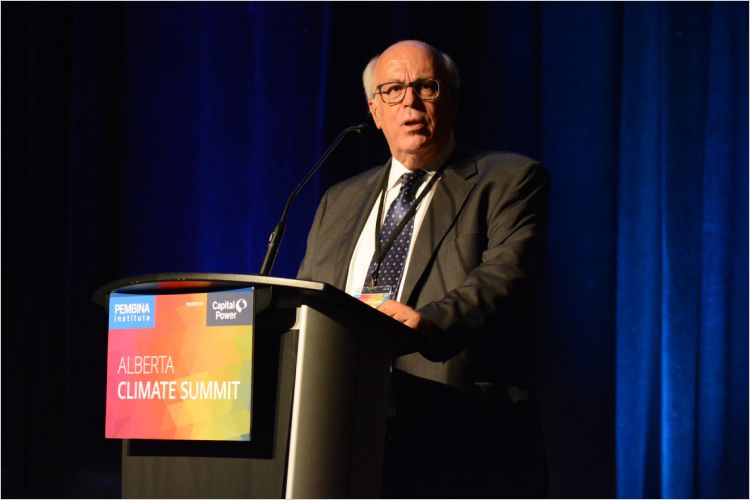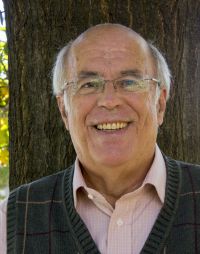
David Runnalls, chair of the Pembina Institute board and Officer of the Order of Canada, speaking at the 2018 Climate Summit in Calgary, Alberta. Photo: Roberta Franchuk, Pembina Institute
Long-time environmentalist, non-profit practitioner, commentator, and chair of the Pembina Institute board David Runnalls was recently appointed Officer of the Order of Canada for “his decades-long commitment to and influence in promoting environmentally sustainable development around the world.”
Runnalls, who has been a member of our board of directors for more than a decade, is a past president and CEO of the International Institute for Sustainable Development and a globally respected expert on international affairs, energy transition and sustainability since his start as a researcher for the first United Nations Conference on the Human Environment, in Stockholm, in 1972.
Runnalls says he is honoured and humbled by the appointment, but that is he looking ahead to the hard work Canada needs to do over the next five years, in order to transition to a clean economy. That work needs to be done as a collaboration between economic, social and environmental stakeholders, he says, something the impact of the COVID-19 pandemic has only served to reinforce.
Here he discusses Canada’s most urgent priorities, what the Order of Canada appointment means to him, and what value organizations like the Pembina Institute bring to the table.
How do you see the current state and future of sustainability work?
We're at the stage now where we have a kind of unprecedented opportunity. I really don't want to say that there's a silver lining to the COVID cloud, but it’s shown all the kinds of holes in the social safety net in Canada — with the number of women being thrown out of work, with the inability to supply affordable childcare, the effects of long-term care, on minorities. Now it seems to me, we have an opportunity to take [that] and marry it up with the opportunity to move toward a low-carbon economy, towards net zero.
There's a very powerful agenda for both social and economic change here, which could provide us with a future where we still have good jobs, where you have a much cleaner environment, and where at least some of the disadvantages in society have been overcome.
 I can see the beginnings of that conversation, but we've never done that before. We've never really reached beyond the environmental community to others who have similar issues, and it takes me back to the old days of the Brundtland Commission in 1987. The Brundtland Commission said sustainable development was the integration of economic, social, and environmental sustainability. We've never been able to make that work. We've always been able to make the link between environment and economics, but it's always been a little too complicated to try and bring in the social considerations. And I think COVID-19 both forces us to do that and gives us an opportunity to do that.
I can see the beginnings of that conversation, but we've never done that before. We've never really reached beyond the environmental community to others who have similar issues, and it takes me back to the old days of the Brundtland Commission in 1987. The Brundtland Commission said sustainable development was the integration of economic, social, and environmental sustainability. We've never been able to make that work. We've always been able to make the link between environment and economics, but it's always been a little too complicated to try and bring in the social considerations. And I think COVID-19 both forces us to do that and gives us an opportunity to do that.
There's a general acknowledgement now in the economics community that we both have to take care of people, while a COVID disaster is on, but we also have to prime the pump to get the economy moving again. We have a once-in-a-generation window here, for a couple of years, to decide what we're going to do next. Spend all this infrastructure money on roads and bridges and tunnels? Or are we going to take the step of beginning to move away from an oil-based economy? That's a monumental step. The terrain is open enough that Canada can begin to take that step. And that's really where I think the Pembina Institute fits.
Where do you see the greatest value of the Pembina Institute?
The Pembina Institute started out as a small Alberta-based organization, and gradually evolved into a national organization, with a national influence, and a national reputation — but one that still has its roots in Alberta.
Alberta is going to be one of the keys to how we begin to move away from a carbon-based economy. We have some credibility in Edmonton and Calgary, which lots of national groups don't. But we also have lots of credibility in Toronto and Ottawa and Vancouver and Edmonton. That's a natural place for us to be — with our roots in the middle of the petroleum business, but our ability to begin to see ways of transitioning into the next level. And it's not going to be easy. It's a very complex set of relationships. It's obviously very complicated politically, very complicated intellectually, but I think we have the brainpower and the reputation to be able to do this sort of thing. It's going to be a critical role in society, as we try to think our way through to how we get to net zero in 2050.
What would you like to see happen in Canada or globally over the next five years?
If you assume, as I do, that the climate science is now pretty hard, then the time between now and 2030 is going to be absolutely critical. If we just sit there and twiddle our thumbs and don't do anything until we get to 2030, the problem is going to be almost impossible to solve. We've got to get going now. We've got to begin to reduce emissions dramatically if we're being able to hit the scientific targets.
But there's also another set of things going on at the same time and that is that Canada has real advantages, but it also has real disadvantages. This is a high-carbon economy that uses a lot of energy and one of whose principal exports is oil. There's a real challenge here as to how we deal with this. This is a lot harder for export-oriented natural resource-based economies, than it is for places like Europe, which essentially is a net importer of virtually every kind of natural resource. It's going to be more difficult, but we're going to have to do it.
"We've got to get going now. We've got to begin to reduce emissions dramatically if we're being able to hit the scientific targets."
If you look at the way in which the automobile industry is going now, for example — all the big players are spending their money on electric vehicles, all their research and development. There's going to be a shift to electric vehicles. The renewable energy industry is growing [incredibly fast]. That means that traditional energy producers are going to be under real pressure because their export markets are going to shrink, their labour forces are going to shrink, and they're going to have real transition issues. Within the next 10 years, there are a number of big oil companies that say that oil demand globally is going to peak no later than 2030 and maybe even earlier than that. There's going to be huge pressure on the high-cost oil producers, dying to become more efficient or go out of business. That's going to be a huge challenge for Canada.
The Pembina Institute is in a very good position to contribute to how we transition away from the high-carbon economy, without leaving everybody high and dry, and without leaving huge swathes of unemployment throughout all of Western Canada. Pembina is in a good position to begin to work through these issues and we have to start now. Because if we do it now, we can do it gradually. If we keep waiting until 2030, it's going to be very abrupt, and it's going to be much more chaotic, and it's going to be much harder to do.
What does the Order of Canada appointment mean to you?
It means a great deal. It means that other people think that what I'm doing with my life is worthwhile. And that I've done a decent job at it. That's all you can ask for. We're not a particularly hierarchical society but we do have this honour system. As far as I can tell it's pretty unbiased… so I could take some pleasure in thinking that people have looked at what I've done for the last 50 years or so and said, ‘hey this guy's not bad, maybe we should give him a little prize.’ I'm actually rather pleased with myself — it all sounds very pompous, and it's not very Canadian — but I'm very honored and humbled to be given the award. Part of it comes from the service I've given as chair of the Pembina Institute for the last 10 years. I feel lucky to be there. This is a young person's organization and I'm an old man. It keeps you young — you get to work with idealistic, intelligent, driven young people. It keeps your brain cells working. I've very much enjoyed the association with the Pembina culture, which is quite different than almost any other organization.
Who or what keeps you inspired?
I had some good mentors. My first job was working for one of the most remarkable women of the twentieth century, a woman called Barbara Ward. She'd been the deputy editor of The Economist; she'd been the youngest governor of the BBC. She wrote books that sold widely. She knew Jack Kennedy. Barbara was quite an extraordinary character. And she was at the heart of all this because she was originally commissioned to write a theme book for the first environment conference in Stockholm in 1972. I got to be her bag carrier, but I also did most of the research for the book.
That brought me into contact with Maurice Strong, who was the Canadian who was the Secretary-General of the first environment conference, and then the second environment conference, and was sort of ‘Mr. Green.’ Maurice was that most extraordinary man, who had made a lot of money in business but who moved seamlessly back and forth between business and public service. That was quite an example for me. Maurice had been the first head of the Canadian aid agency, CIDA. He'd been a very successful investor — in fact Power Corporation was essentially created out of a number of things that Maurice owned, which he sold off before he went back into public service. He then ran the second major environment conference in Rio and was a kind of guru to lots of people worried about international environmental issues. I worked quite closely with Maurice until the day he died.
The other one was Jim MacNeill, who was also a Canadian. He was the Secretary-General of the Brundtland Commission, which invented the term ‘sustainable development.’ Jim wrote the report. And Jim was an old-fashioned, Saskatchewan radical. He then worked for Tommy Douglas. I don't know how he voted, but he certainly was a social democrat and Jim had a social conscience which was a mile wide.
That was an interesting group of people that sort of mentored me through all of this. And, you know, there have been lots of bumps in the road — I mean, the times you wake up and you think ‘Geez I've been doing this for 30 years, absolutely nothing has happened. And everything's actually getting worse than it was before.’ That's true for all of us who have been in this business a long time. The world is much, much worse off. When it comes to climate change, energy use, biodiversity loss, marine pollution, plastics pollution, the whole thing. Sometimes it gets overwhelming.
But we are now starting to see a serious shift. There is a major shift in public opinion in every country, including the United States, about the need to do something about CO2 emissions and biodiversity loss. Governments are now being pushed in ways that they have never been pushed before to do something about it. The Greta Thunberg movement is quite important because basically it's going to be their problem, and they should not put up with us not doing anything to solve it. It's quite powerful.
There's no way that this is an easy and clear and simple transition. But it's gathering steam in ways I didn't think it would, so in my old age, I actually feel sort of slightly more optimistic about the future than I did 10 years ago.
Eva Salinas was a senior communications lead at the Pembina Institute, Canada’s leading clean energy think-tank.



